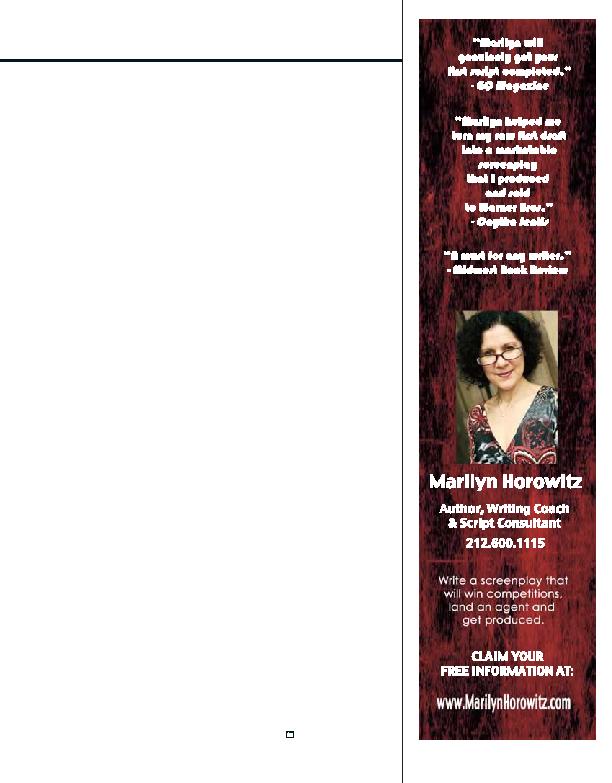
was much more frustrating than the years of
being a kid who just didn't know better.
point and constantly told myself that I had
to figure something else out. I needed a Plan
B. I was getting older, I had reached my thir-
ties, I had lost my agent, I was broke. It was
pretty dark.
ply, "This is too hard to succeed at and I
need to be realistic." So I decided to become
a stockbroker. But I never quite got there
because the market crashed in 2001.
weren't going anywhere. I didn't have a
car. I didn't have an agent. Those were the
darkest days.
getting an agent, selling a script and mak-
ing money. I couldn't keep depending on
that because it wasn't happening. I told my-
self, "If the script I write is better than the
last -- if, within the process I'm getting bet-
ter as a writer -- then I am a success. It does-
n't matter if it sells; it doesn't matter if it
gets me an agent. That's my parameter."
craft and finding my voice as opposed to
selling a script, getting an agent and mak-
ing a lot of money.
enough to be at the table. Often, it's not a
case of not being good enough. It's a simple
case of it being that hard to get a seat. There
are not a lot of seats at the table and there
are a lot of people trying to sit at the table.
It's that simple.
brain that everyone responded to, called The
Only Living Boy in New York -- that was the
one that got me at CAA and noticed.
at a professional level a few years before I
broke onto the scene in a major way -- I
was ready. I could hit it and I did.
cause of a great idea or a hot spec, and they
don't know what to do with it. It's just as
hard, if not harder, on the inside than it is
on the outside, by the way.
and talent is important, but talent's just
your outside jumper. You need to play de-
fense. Defense is professionalism and part of
professionalism is you have got to be on
time. You've got to hit your deadlines.
today. I don't feel it." No, he goes in and
he does it every day. It's what he does for
a living. You're a professional. You've got
to act like a professional. It's huge in terms
of getting work.
ment. My agent called me and said, "Brian
Grazer has a very basic notion for a movie
idea. It's basically a question: If your best
friend's spouse was cheating and you knew,
do you tell him?
question. I think that the guy code response
is, `Of course you tell him. That's man code.
You tell him immediately.' But then I went
to a few dinners with a group of people and
I floated the question and it was such an ac-
tive debate. Not everybody said yes, and
many people, in fact, said, "You don't tell
him." Some people said, "No, you go to the
spouse and give them an ultimatum and
say they have 24 hours to tell them. And if
they don't tell them, you will." I said,
"That's fucking great! That's a scene in my
movie right there."
"Wow, I get to go write this. I get to bring
this debate to the screen. What a great
gift!"
through everything I see, feel or go
through in my life on the page. It's the
greatest gift and blessing of all. It's not
even a job. It's free therapy and they're
paying me for it.